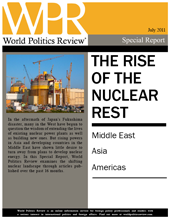International Law Archive
Free Newsletter
The announcement this week that Israel’s cabinet approved a new maritime demarcation agreement with Cyprus may pave the way for Israel to start tapping prized offshore oil and gas reserves in the Eastern Mediterranean. But it also exacerbates an already tense geopolitical standoff between Israel, Lebanon, Turkey and Cyprus surrounding the energy reserves, which, though relatively small compared to those in the Persian Gulf, are estimated to be worth billions. “You’ve got all the ingredients for a problem,” says James M. Dorsey, a World Politics Review contributor and senior research fellow at the National University of Singapore’s Middle East Institute. […]

In the aftermath of Japan’s Fukushima disaster, many in the West have begun to question the wisdom of extending the lives of existing nuclear power plants as well as building new ones. But rising powers in Asia and developing countries in the Middle East have shown little desire to turn away from plans to develop nuclear energy. In this Special Report, World Politics Review examines the shifting nuclear landscape through articles published over the past 16 months. Below are links to each article in this special report, which subscribers can read in full. Subscribers can also download a .pdf version […]
Israel’s proposal for a special naval court to confiscate ships may be an attempt to deter future pro-Palestinian flotillas from bringing aid to Gaza. But it prompted a fresh round of debate over how far Israel can go with its naval blockade before breaching international law. According to U.S. Navy Commander James Kraska, a professor of International Law at the Naval War College in Rhode Island and a contributor to World Politics Review, the answer is pretty far. “Under the law of blockade, nations can seize vessels that fail to ‘heave to’ in order to allow for the belligerent right […]
